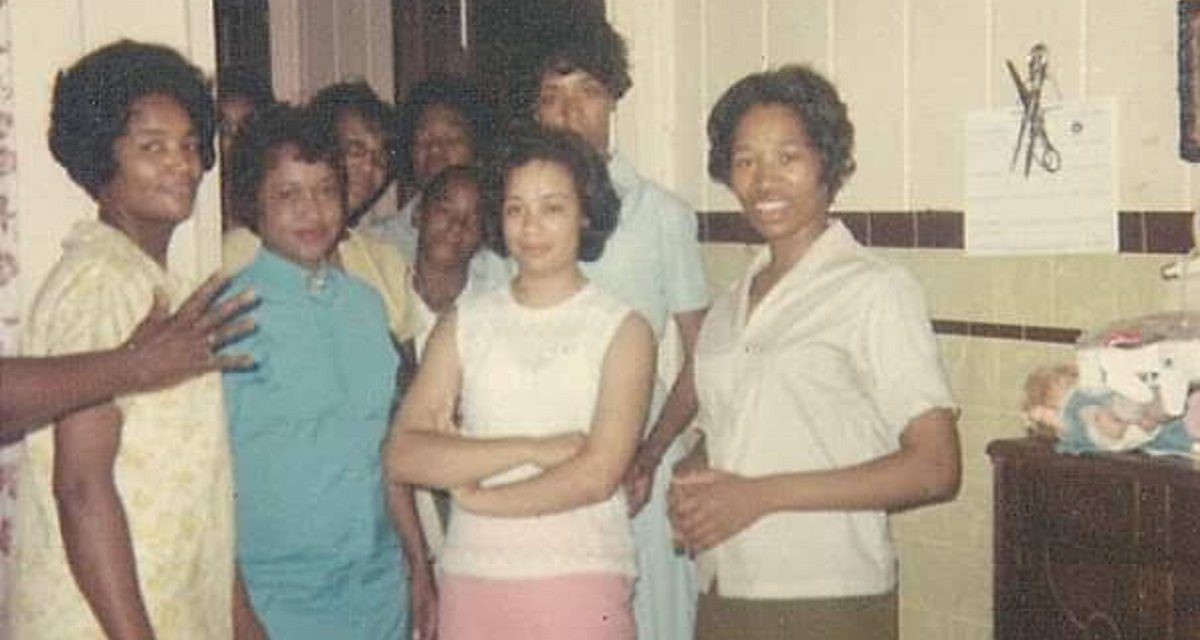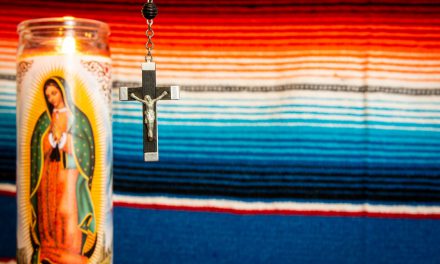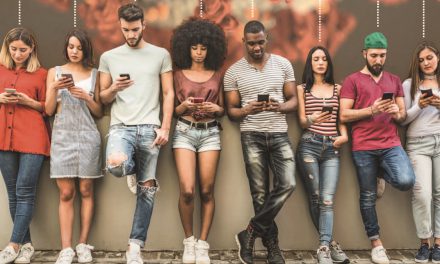By Tonia Wright
(My mother is the woman standing in the middle, resolute, with her arms crossed.)
The recent celebration of the 100th anniversary of women’s suffrage reminded me that at one time, my mother’s right to vote did not come with the same parity and entitlement that I have taken for granted. I asked her what it was like to vote for the first time, how it impacted her, and what this latent privilege meant as a Black woman. She took me back to a time and place that seemingly looked and felt different from today.
In 1960, a gallon of gas was $0.31, a loaf of bread cost about a quarter, and the federal minimum wage was $1.00. It was the first year my mother, in her early 20s at the time, would cast her vote for an American president. That was a pivotal moment in her life. She understood the power that vote yielded.
Refuse to give up. Resist being sidelined.
Growing up in segregated Kansas on a rural family farm, my mother saw a lot and endured even more. The eldest of 15 children, she is the matriarch, the one people respect and look up to. Only five feet and two inches tall, what she lacked in physical stature, she more than made up in sheer tenacity. To this day, her word is her bond. Through unrelenting grit, she overcame barriers erected to deny her a good education, employment opportunities, and fair housing.
She demonstrated, time and time again, a come-from-behind, warrior spirit that always managed to finish strong. I watched her on many occasions make a dollar out of 15 cents, working two jobs, and sending her children to the best schools. She sacrificed greatly so that my brother, sister, and I could live well and compete academically with the kids who were born with silver spoons.
When I think about what makes my mom the woman she is, and how she embodied an unapologetic toughness, I can’t help but equate it, at least in part, to the years as a young person creating her unique rhythm in a nation that excused discrimination, racism, and offtimes celebrated social injustice. For her, the choice was simple: hold the line, refuse to give up, and resist being sidelined.
I liken her relentless drive to those of other front-line warriors, civil rights activists like Dr. Martin Luther King, Coretta Scott King, Georgia Congressman John Lewis, Jimmie Lee Jackson, Ruby Bridges, A. Philip Randolph, Maude Ballou, Rev. Hosea Williams, Rosa Parks, Rev. Dr. Pauli Murray, Claudette Colvin, Ralph D. Abernathy, Diane Nash, E.D. Nixon, Bayard Rustin, Andrew Young, Jr., and so many others, who risked life and limb for racial justice and the right to vote.
Like these civil rights heroes, my mother honored this right. We often went to the polls with her on election day, and since 1960, she has never missed an election – not even a local one. Mom knew she wasn’t only voting for herself, but for her ancestors who never had the chance. This year, I had the honor and privilege of taking my mother and daughter to the polls to early vote. The vote I cast was dedicated to mom and all that she sacrificed so that I could be in a position to not only write this article, but to serve as the publisher of accessHealth and disseminate news and information to our readership – something we’ve had the honor to do for eight years.
The millions of early voters recognize this critical juncture that hopefully will give way to pronounced change. But as we make moves to exercise our voting rights it’s important to retrospect, so that we don’t lose heart.
A cursory look at the days prior to the Voting Rights Act of 1965
For context, the 15th Amendment of the U.S. Constitution in 1870 granted Black [men] the right to vote by declaring the “right of citizens of the United States to vote shall not be denied or abridged by the United States or by any state on account of race, color, or previous condition of servitude.”
For nearly a century afterward, suppression tactics effectively denied Blacks the right to vote. This included everything from violence, poll taxes, literacy tests, discriminatory voting registration practices, fraud (discarding votes, miscounting ballots, etc.), stupid maneuvers like the jellybean test, and many other exclusionary acts to deny and suppress the Black vote.
However, the sheer tenacity of civil rights leaders who had the audacity to challenge centuries of Jim Crow and other structurally racist constructs, refused to give up, and resisted being sidelined even when political leaders were reticent to push the envelope toward parity out of fear of alienating their white base. Still, civil rights leaders held the line, and remained steadfast even as President John F. Kennedy’s assassination shook up the White House and Lyndon B. Johnson was sworn in as the 36th president. Now the onus was on his administration to take up the mantle for civil rights.
The legislation had been proposed by President John F. Kennedy in June 1963, but it was opposed by filibuster in the Senate. After Kennedy was assassinated on Nov. 22, 1963, Johnson pushed the bill forward. The United States House of Representatives passed the bill on February 10, 1964, and after a 54-day filibuster, it passed the United States Senate on June 19, 1964.
Johnson’s defeat of Republican challenger Barry Goldwater secured his presidency on Nov. 3, 1964. Less than a year later, and after unrelenting pressure from civil rights activists, Johnson signed into law the Voting Rights Act of 1965. This made it unlawful for states, especially those in the South, to use unsavory tactics to suppress, deny, or violate the voting rights of Blacks and other marginalized people.
Flash forward 55 years later, voter suppression and misinformation persist as a pandemic threatens to claim more casualties, already killing 200,000 people. For many, mail-in or absentee voting is necessary to avoid potential exposure to the coronavirus. However, like the 1960s, and years prior, there is a power dynamic that favors privilege over parity.
Now it’s up to us to hold the line.
Vote early. Vote like your life depends on it.
If you haven’t done so already, vote. Reach out to your elderly family members, friends, and neighbors, or other vulnerable individuals, and help them vote absentee. If they prefer to vote in person, provide a ride to the polls if necessary. And remember, you can vote in-person absentee from Sept. 22, 2020, through Nov. 2, 2020 prior to election day. Get your plans in order, today. The below resources will help.
How do I check to see if my voter registration is current?
Follow this link to verify your voter registration. (Missouri voter registration ended October 7, 2020.)
What are my current voting options?
Vote in-person absentee (Missouri allows early voting from September 22 through November 2, 2020 from 8:30 a.m. to 4:30 p.m. and Saturday, Oct. 31, 2020 from 8 a.m. until noon. Contact your local election authority to find your early-voting location.
Vote on election day, Nov. 3, 2020, from 6 a.m. until 7 p.m. in Missouri.
Note: If you haven’t mailed your ballot, don’t wait. Mail it, today!
If I vote in-person absentee, do I have to get my ballot notarized?
No. If you vote in-person absentee, you are not required to notarize your ballot. However, you cannot use the in-person absentee to cast a mail-in ballot. If you are opting to mail in your ballot, it must be postal mailed. USPS requires these ballots be mailed seven days prior to election day.
What are acceptable forms of ID?
For all deemed acceptable forms, follow this link.
How do I report voter intimidation or suppression?
If you suspect voter intimidation or suppression, report it to Missouri’s Election Integrity Unit. You can also contact your local FBI office, or local U.S. attorney’s office.
Tonia Wright, who authored this pieces, is the CEO of Grace Advertising & Consulting, Inc., and the publisher of accessHealth News.








